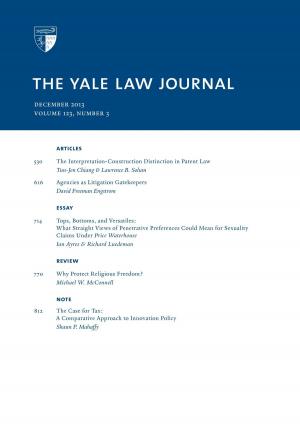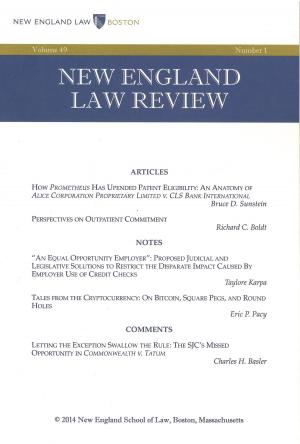Stanford Law Review: Volume 64, Issue 3 - March 2012
Nonfiction, Reference & Language, Law, Gender & the Law, Jurisprudence| Author: | Stanford Law Review | ISBN: | 9781610279468 |
| Publisher: | Quid Pro, LLC | Publication: | April 18, 2014 |
| Imprint: | Smashwords Edition | Language: | English |
| Author: | Stanford Law Review |
| ISBN: | 9781610279468 |
| Publisher: | Quid Pro, LLC |
| Publication: | April 18, 2014 |
| Imprint: | Smashwords Edition |
| Language: | English |
A leading law journal features a digital edition as part of its worldwide distribution, using quality ebook formatting and active links. The March 2012 issue of the Stanford Law Review contains studies of law, economics, and social policy by recognized scholars on diverse topics of interest to the academic and professional community.
Contents for the March 2012 issue (number 3 of Volume 64) include:
Prosecuting the Exonerated: Actual Innocence and the Double Jeopardy Clause
By Jordan M. Barry
From Multiculturalism to Technique: Feminism, Culture, and the Conflict of Laws Style
By Karen Knop, Ralf Michaels & Annelise Riles
Fragmentation Nodes: A Study in Financial Innovation, Complexity, and Systemic Risk
By Kathryn Judge
Note: Insurmountable Obstacles: Structural Errors, Procedural Default, and Ineffective Assistance
By Amy Knight Burns
Comment: The Gulf Coast Claims Facility and the Deepwater Horizon Litigation: Judicial Regulation of Private Compensation Schemes
By Colin McDonell
A leading law journal features a digital edition as part of its worldwide distribution, using quality ebook formatting and active links. The March 2012 issue of the Stanford Law Review contains studies of law, economics, and social policy by recognized scholars on diverse topics of interest to the academic and professional community.
Contents for the March 2012 issue (number 3 of Volume 64) include:
Prosecuting the Exonerated: Actual Innocence and the Double Jeopardy Clause
By Jordan M. Barry
From Multiculturalism to Technique: Feminism, Culture, and the Conflict of Laws Style
By Karen Knop, Ralf Michaels & Annelise Riles
Fragmentation Nodes: A Study in Financial Innovation, Complexity, and Systemic Risk
By Kathryn Judge
Note: Insurmountable Obstacles: Structural Errors, Procedural Default, and Ineffective Assistance
By Amy Knight Burns
Comment: The Gulf Coast Claims Facility and the Deepwater Horizon Litigation: Judicial Regulation of Private Compensation Schemes
By Colin McDonell















